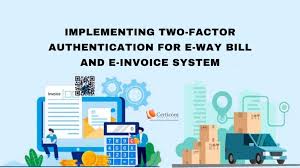
Mandatory multi-factor authentication for E-Way Bill and E-Invoice Generation: GST compliance update effective April 1, 2025
NEW DELHI : Taxpayers with an aggregate annual turnover (AATO) exceeding ₹100 crore have been required to use multi-factor authentication (MFA) since August 2023.
According to an advisory on the GST portal, MFA will become mandatory for accessing updated versions of the E-Way Bill and E-Invoice systems for all taxpayers starting April 1, 2025. Additionally, new provisions will be introduced to restrict the generation of E-Way Bills.
The rollout of MFA will occur in phases:
- From January 1, 2025, it will apply to taxpayers with an AATO exceeding ₹20 crore.
- From February 1, 2025, it will cover taxpayers with an AATO exceeding ₹5 crore.
- By April 1, 2025, it will be mandatory for all taxpayers and users.
Since August 20, 2023, MFA has been mandatory for taxpayers with an AATO exceeding ₹100 crore, and since September 11, 2023, it has been optional for those with an AATO exceeding ₹20 crore.
These changes have been made as the National Information Centre (NIC) will roll out updated versions of the E-Way Bill and E-Invoice Systems effective January 1, 2025. “These updates are aimed at enhancing the security of the portals, in line with best practices and government guidelines,” the advisory said.
An E-Way Bill is a document required to be carried by a person in charge of the conveyance carrying any consignment of goods of value exceeding ₹50,000. It is generated from the GST Common Portal for the E-Way Bill system by registered persons or transporters who cause the movement of goods of consignment before the commencement of such movement.
As per Rule 48(4) of CGST Rules, the notified class of registered persons have to prepare an invoice by uploading specified particulars of the invoice (in FORM GST INV-01) on the Invoice Registration Portal (IRP) and obtain an Invoice Reference Number (IRN). After following the above ‘e-invoicing’ process, the invoice copy containing inter alia the IRN (with QR Code) issued by the notified supplier to the buyer is commonly referred to as ‘e-invoice’ in GST.
It is important to note that ‘e-invoice’ in ‘e-invoicing’ doesn’t mean the generation of an invoice by a government portal. The invoice not registered on the portal will not be valid. In such a situation, input tax credit (ITC) on the same cannot be availed by the recipient and will attract applicable penalties. Since August 1, 2023, E-Invoice is mandatory for assesses with AATO of ₹5 crore.
The advisory also announced new restrictions on E-Way Bill generation. Starting January 1, 2025, E-Way Bills can only be generated for documents dated within 180 days of the generation date. For example, documents dated before July 5, 2024, will no longer be eligible for E-Way Bill generation after January 1, 2025.
Additionally, the extension of E-Way Bills will be limited to 360 days from their original generation date. For instance, an E-Way Bill generated on January 1, 2025, can only be extended until December 25, 2025.
The advisory urged taxpayers to familiarize themselves with these updates and make the necessary adjustments to their compliance processes.

